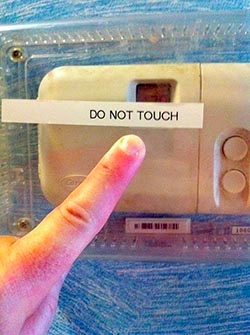 I’ve always been a rebel at heart. I’ve never dealt very well with authority. I chafe at having to obey orders. And I delight in small acts of rebellion. (That’s me on the right touching where it says not to touch in a restaurant a few years ago.)
I’ve always been a rebel at heart. I’ve never dealt very well with authority. I chafe at having to obey orders. And I delight in small acts of rebellion. (That’s me on the right touching where it says not to touch in a restaurant a few years ago.)
I also oppose coercive government. I say it’s because of my reasoned principles — and I can explain the principles easily — but I wonder sometimes how many people who come to oppose government (to one degree or another) are really just acting out their dislike of rules and authority.
I believe that the system we have — by which a majority imposes its will on the rest of us — is immoral. But the immoral thing about it that’s wrong is the imposition of rules by force. When I listen to discussion among a lot of people who consider themselves libertarians or anarchists, I get the feeling that many of them aren’t just opposed to rulers. A surprising number seem to hate rules, too.
But when I think about the kind of world I want to live in, I realize that I want rules. I want order. Most people do. So how do we resolve those two — and is it possible that we need to be more honest with ourselves about our psychological feelings about rules themselves?
At the heart of many individualists who oppose coercive government is a personality that believes — deep down, whether it’s spoken or not — that “I know better than other people.” As a group, these individualists are very, very smart and can also tend to be very, very arrogant. We don’t always play well with others.
But I want rules. I simply want to live with rules that make sense to me.
When I drive, for instance, I get irritated with other drivers who don’t obey certain rules that make driving safer and more convenient for everyone. I don’t want an “every man for himself” attitude. I want order and I want drivers taking turns in ways that are set out in the accepted rules. I’m angry with those who ignore the rules in ways that encourage a breakdown of the order that makes the experience better for everyone.
I don’t want to live in a city where people randomly ignore rules and where people make up their conduct as they go. That’s why I favor different groups or companies setting up cities and managing them according to the rules agreed upon in advance. Different cities can be set up with different rules. And other areas — with other ownership — might be set up with few rules or even no rules other than respect for property boundaries.
My goal in getting past coercive government isn’t to live in a place with no rules. I don’t want to live in a place where my neighbors randomly fire weapons right next to me or play really loud music out in their yards. I don’t want junked cars in the yards of my neighbors, either. I like rules that give my neighbors and myself better quality of life — in ways that matter to me — but I want us to agree on those rules before we move into a place. I don’t want politicians having the power to change rules simply because they want to.
In order to have a higher quality of life, I have to agree to certain rules for all of us. But I want rules — not rulers. I don’t want some majority (or any other group) to have the ability to impose rule changes on me. I don’t want a group deciding that I have to hand over more money than I’ve agreed. I don’t want politicians or bureaucrats deciding what I can do with my property. I want the rules to decide those things — rules that I have agreed to.
I’m afraid that too many people who call themselves individualists or libertarians or anarchists or voluntaryists have a personality-based idea that rules are always bad. I obviously have a bit of a tendency in that direction too. But we need to remind ourselves that rules we agree upon are good. Rulers who impose rules are always bad.
 Right of secession? In a sane world, we could talk about it in 2011 without talk of slavery
Right of secession? In a sane world, we could talk about it in 2011 without talk of slavery Sharing ridiculous things we enjoy is a special part of being in love
Sharing ridiculous things we enjoy is a special part of being in love Online exposure doesn’t bug Lucy, but humans require some privacy
Online exposure doesn’t bug Lucy, but humans require some privacy